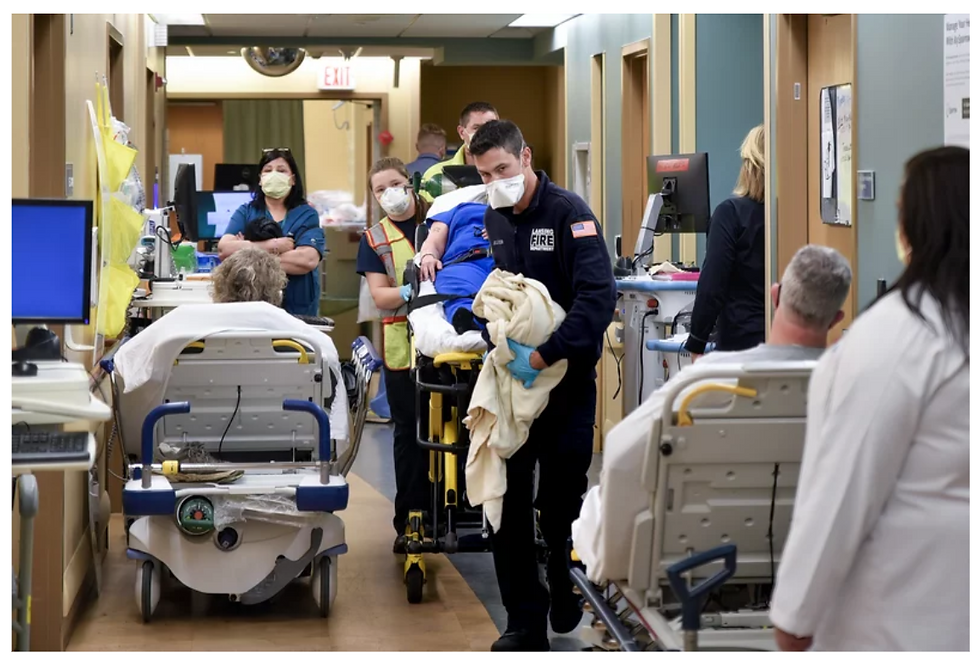Emergency Department: Boarding Is on the Rise
- Joe Ebberwein

- Aug 12, 2025
- 3 min read

Emergency department (ED) boarding remains a growing crisis. National analyses show that as of 2024:
In peak months, nearly 40% of admitted patients were boarded for 4 hours or more, with 6% waiting 24 hours or longer (IHPI).
Among patients aged 65 and older, those waiting more than 8 hours increased from 12% in 2017 to 20% in 2024; boarding over 3 hours climbed from 22% to 36% over the same period (AJMC).
Boarding disproportionately impacts older adults, dementia patients, and individuals requiring behavioral health services. A joint AP/Side Effects Public Media investigation found that by 2022, one in six ED admissions involved a wait of four hours or more, with 50% of those boarded being age 65+ (AP News).
In states like Connecticut, boarding rates are staggering: 38.7% average rate of waits over four hours statewide, with some hospitals reporting over 60% (CT Insider). Behavioral health-related visits in Massachusetts saw boarding stretch from 31% in 2020 to nearly 39% by May 2024, many lasting 12+ hours (Massachusetts Health Policy Commission).
Why This Matters for High-Risk, Immobile Patients
For patients who can’t reposition themselves, such as post-operative, elderly, or dementia patients, the risks of extended ED boarding are serious:
Rapid Onset of Hospital-Acquired Pressure Injuries (HAPIs): Pressure ulcers can begin forming in as little as two hours on hard ED stretchers, especially with limited repositioning.
Moisture-Associated Skin Damage: Extended waiting, especially when patient hygiene is deprioritized, increases the risk of skin breakdown and fungal infections.
Delayed Clinical Attention: Wound risk may go unnoticed or undocumented, fueling later complications and compliance gaps during surveys.
Exposure to Infection: Crowded ED environments elevate exposure to pathogens, raising the risk for immobile patients with wounds.
Worsening of Existing Wounds: Chronic wounds suffer from delayed dressing changes and missed consults, leading to deterioration.
Increased Morbidity & Mortality Risk: Boarding has been tied to adverse events, delays in critical treatments, and even elevated in-hospital death rates (AHRQ).
How Corstrata Helps Mitigate These Risks
Corstrata is uniquely positioned to support hospitals grappling with ED boarding and related wound care challenges:
Our Virtual Wound & Ostomy Care Solution
Rapid deployment of certified WOC nurses for on-demand consults, even during off-hours and weekends.
Proactive wound risk assessments at triage or during boarding periods, flagging high-risk patients for early intervention.
Real-time documentation and early detection, reducing the likelihood of post-admission HAPI classification and CMS penalties.
Skin care protocols and repositioning guidance reduce the incidence of both pressure injuries and MASD.
Specialized ostomy support, addressing acute issues like pouch leaks or peristomal skin breakdown.
Strategic Benefits
Helps hospitals avoid costly penalties tied to HAPI events.
Strengthens compliance readiness during CMS or Joint Commission surveys.
Supports health equity goals by offering consistent care for older, non-English-speaking, or underserved patients disproportionately affected by boarding.
Delivers a scalable, cost-effective solution without requiring additional in-person staffing.
Protect Your Vulnerable Patients by Partnering with Corstrata
ED boarding isn’t just an operational headache; it’s a patient safety issue, a financial burden, and a growing equity concern. If your hospital is facing rising wait times and the risk of avoidable HAPIs, Corstrata is ready to help.
We offer:
Virtual wound and ostomy consults for boarding patients
Risk stratification at ED admission
Standardized documentation tools
Clinician support for wound prevention protocols
Connect with Corstrata today to learn how our services can help you to protect high-risk patients, reduce complications, and minimize financial exposure.
👉 Schedule a consultation today to learn how Corstrata can support your team
About Corstrata
Corstrata is a virtual care solution that utilizes technology to provide access to scarce certified wound, ostomy, and continence nurses (WOCNs) at the patient's bedside in multiple provider settings, including home health, hospice, skilled nursing facilities, and hospitals across all 50 states. Corstrata's team of WOC nurses provides consultations with provider staff at the patient's bedside, either through HIPAA-compliant video or through review of store-and-forward wound images, to improve clinical and financial outcomes for providers.



Comments